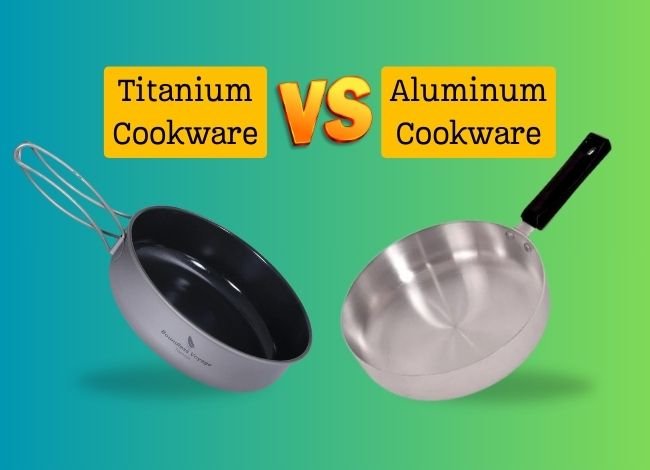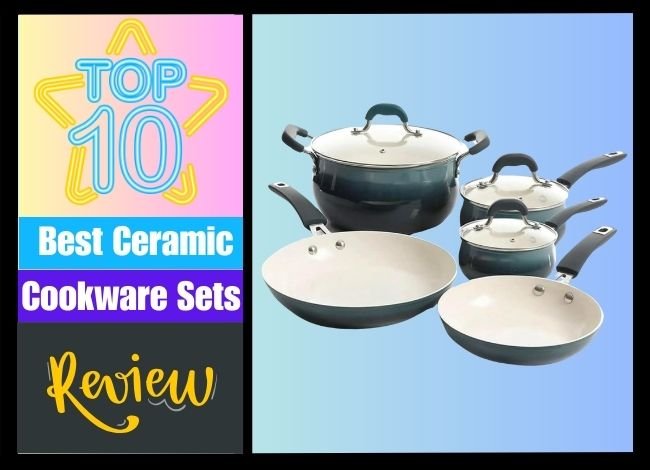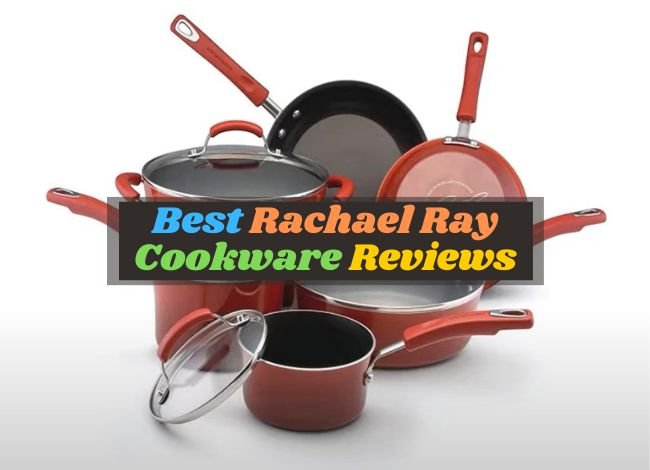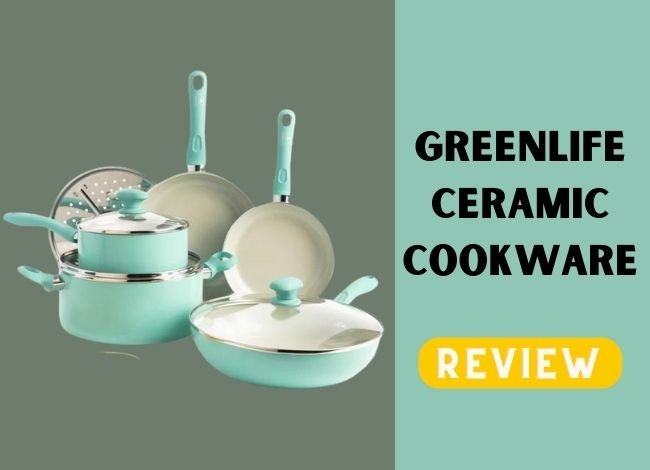Last Updated on January 29, 2024
Titanium Cookware
Titanium cookware is renowned for its exceptional strength and lightweight properties. Originating from the aerospace industry, titanium is more durable and harder than aluminum, making it less prone to dents and scratches. This material is non-toxic and safe for cooking, as it does not react with food ingredients. Titanium cookware often features a non-stick coating, which reduces the need for cooking oils and makes cleanup a breeze. However, it’s important to note that pure titanium cookware can be expensive. Its superior heat conduction ensures even cooking, making it a favorite among professional chefs and home cooks alike. Despite its higher cost, titanium’s longevity and health benefits make it a worthwhile investment for those prioritizing quality and safety in their kitchen.
Aluminum Cookware
Aluminum cookware is a popular choice due to its excellent thermal conductivity and affordability. It heats up quickly and evenly, preventing hot spots that can cause uneven cooking. Aluminum is lightweight, making it easy to handle, especially when dealing with larger pots and pans. However, its softer nature means it’s more susceptible to warping and scratching compared to titanium. A significant concern with aluminum cookware is its tendency to react with acidic foods, potentially leaching into meals and altering flavors. Most aluminum cookware is anodized or coated to combat this, enhancing its durability and reducing reactivity. This makes it a versatile and budget-friendly option for everyday cooking, suitable for a wide range of culinary tasks. Aluminum cookware’s ease of use and affordability make it a staple in many kitchens, offering good performance without a hefty price tag.
Comparison Table: Titanium vs. Aluminum Cookware
| Feature | Titanium Cookware | Aluminum Cookware |
|---|---|---|
| Weight | Very light | Light |
| Strength | Extremely strong | Strong, but less than titanium |
| Durability | Highly durable | Durable, but can dent or warp |
| Heat Conductivity | Good, but less than aluminum | Excellent |
| Heat Distribution | Even | Very even |
| Corrosion Resistance | Highly resistant | Resistant, but can corrode over time |
| Non-Stick Properties | Often non-stick, varies by coating | Often coated for non-stick properties |
| Reactivity | Non-reactive | Can react with acidic foods |
| Maintenance | Easy, often dishwasher safe | Easy, but may require special care |
| Cost | More expensive | Less expensive |
 |
 |
Key Difference: Titanium vs. Aluminum Cookware
Durability and Strength
Titanium cookware boasts superior durability and strength compared to aluminum. This is primarily due to titanium’s higher tensile strength and resistance to warping under high temperatures. It’s less prone to scratches or dents, making it a long-lasting option. In contrast, aluminum, while durable, can deform or scratch more easily. This difference is crucial for those who prioritize longevity and robustness in their cookware.
Weight and Portability
Aluminum cookware is known for its lightweight properties, making it a favorite among backpackers and campers. It’s easy to handle and transport, providing convenience without the burden of heavy weight. Titanium, though also lightweight, tends to be slightly heavier than aluminum. However, it still offers a good balance between strength and weight, making it a practical choice for outdoor activities as well as everyday kitchen use.
Heat Conductivity and Cooking Performance
Aluminum excels in heat conductivity. It heats up quickly and evenly, allowing for precise temperature control – a feature highly valued in culinary settings. This makes aluminum cookware ideal for tasks requiring consistent heat distribution, like sautéing or simmering. Titanium, while it heats up well, does not conduct heat as efficiently as aluminum. It may result in less uniform cooking and can require adjustments in cooking techniques.
Corrosion Resistance and Chemical Reactivity
Titanium cookware offers exceptional corrosion resistance. It doesn’t react with acidic or alkaline foods, ensuring it won’t leach into your cooking. This feature makes it a safer and healthier choice, especially for acidic dishes. Aluminum, conversely, can react with certain foods, particularly acidic ones, potentially affecting both the cookware and the food flavor. However, most aluminum cookware is anodized or coated to prevent this.
Cost and Availability
In terms of cost, titanium cookware is generally more expensive than aluminum. This is due to the higher costs associated with its production and its durability and health safety benefits. Aluminum cookware is more widely available and comes in a variety of price points, making it accessible for all budgets. The choice between the two often comes from personal preference and willingness to invest in long-term durability versus immediate cost savings.
Health and Safety Considerations
Health safety is a significant factor in cookware choice. Titanium is often favored for its non-toxic and inert properties. It doesn’t leach chemicals or metals into food, making it a safe option for cooking. While generally considered safe, aluminum can raise concerns when used with highly acidic or alkaline foods. However, as mentioned earlier, most aluminum cookware is treated to minimize these risks.
Environmental Impact
The production of both titanium and aluminum has environmental implications. However, the process of extracting and refining titanium is more energy-intensive and has a higher environmental impact compared to aluminum. Aluminum is one of the most abundant elements and is easier to recycle, making it a more eco-friendly option in some respects. Environmental-conscious consumers might prefer aluminum for its lower ecological footprint, though it’s essential to consider the cookware’s entire lifecycle.
Titanium vs Aluminum Cookware. Who is the Winner?
When comparing titanium and aluminum cookware, the decision largely depends on individual needs and priorities. Titanium stands out for its durability, non-reactivity, and health benefits, making it an excellent choice for those who value long-term investment and safety. Its non-stick properties and even heat distribution are ideal for cooking a wide variety of dishes. On the other hand, aluminum cookware excels in thermal conductivity and affordability, making it suitable for both novice cooks and those on a budget. Its lightweight nature and ease of use make it a practical choice for everyday cooking; however, the potential for reactivity and less durability are worth considering. Ultimately, the winner depends on what you value most in your cookware: titanium for longevity and health, or aluminum for cost-effectiveness and convenience.
Conclusion
In conclusion, both titanium and aluminum cookware have their unique advantages and drawbacks. Titanium offers durability, safety, and excellent cooking performance, albeit at a higher price. Aluminum, while affordable and highly conductive, lacks titanium’s longevity and non-reactive properties. Your choice should align with your cooking needs, health considerations, and budget. Whether you opt for titanium’s robustness or aluminum’s practicality, selecting the right cookware can significantly enhance your cooking experience and the quality of your meals.
Frequently Asked Questions
- Is titanium cookware safer than aluminum?
- Yes, titanium is considered safer as it is less reactive and doesn’t leach into food, unlike some forms of aluminum cookware which can, especially when cooking acidic foods.
- Can aluminum cookware cause health issues?
- Excessive intake of aluminum can be harmful, but aluminum cookware is generally considered safe. However, to prevent leaching, it’s advised to avoid cooking highly acidic or alkaline foods in aluminum.
- Why is titanium cookware so expensive?
- Titanium is more expensive due to its high strength-to-weight ratio, durability, and the complex extraction and manufacturing process.
- Is titanium cookware non-stick?
- Pure titanium cookware is not non-stick; many titanium cookware sets are coated with non-stick materials.
- How does the thermal conductivity of aluminum compare to titanium?
- Aluminum has better thermal conductivity than titanium, meaning it heats up faster and more evenly.
- Can I use metal utensils on titanium and aluminum cookware?
- Metal utensils can scratch the surface of aluminum cookware, especially if it’s coated. Titanium is more scratch-resistant, but using wooden or silicone utensils is generally safer for the longevity of any cookware.
- Are there any foods that shouldn’t be cooked in aluminum cookware?
- Yes, avoid cooking highly acidic or alkaline foods in aluminum cookware, as these can cause more aluminum to leach into the food.
- How do I care for and clean titanium cookware?
- Titanium cookware should be washed with a mild detergent and a soft sponge. Avoid using abrasive cleaners or scrubbers that can damage the surface.
- Is aluminum cookware compatible with induction cooktops?
- Most aluminum cookware is not induction-compatible unless it adds a magnetic layer to the base. Titanium cookware, however, is often compatible with induction cooktops.
- Does titanium cookware react with acidic foods?
- No, titanium is highly resistant to corrosion and does not react with acidic foods, making it safe for cooking a variety of dishes.
- Which is more environmentally friendly: titanium or aluminum cookware?
- Titanium is generally more environmentally friendly due to its durability and longer lifespan, reducing the need for frequent replacements. However, the extraction and processing of titanium can have a significant environmental impact.




